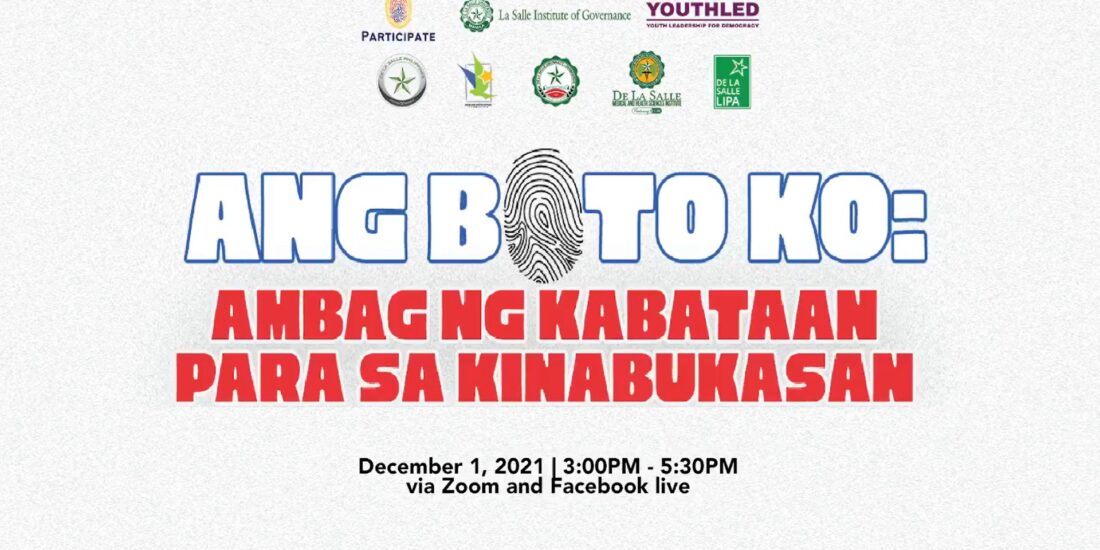BJPC’s Bata, Bata, Boboto Ka Ba? empowers the youth’s important duty in the 2022 elections
In preparation for the upcoming national elections, the Broadcast Journalism Program Council (BJPC) conducted a youth voting webinar Bata, Bata, Boboto Ka Ba? on May 29 from 1:00 PM to 5:00 PM, via Zoom and Facebook Live.
Co-presented by iMPACT Leadership, Boto ng Kabataan, DLSUD-University Student Election Commission, La Estrella Verde, Millennials PH, UTOPIA-CvSU Political Science Society, Buhay MassComm, We The Youth Vote, and Eleksyon 2022 Koalisyon, the webinar aimed to encourage the youth to be involved in achieving social change and being an informed voter, and was attended by over a hundred college students both inside and outside the University.
Experts and youth advocates were featured throughout the event, including lawyer and Binibining Pilipinas International 2019 Atty. Patch Magtanong, Miss Trans Global 2020 Mela Habijan, former paralegal and private lawyer Atty. Gleim Eran, and award-winning journalist Mr. Manny Mogato.
What the youth can do
The youth always had the power to make our country a better place, but this can seem daunting for some – if not impossible – especially for those who don’t know where to start. This is why we should learn about what exactly we can do, and how we can encourage others to do it.
Specifically, Atty. Patch Magtanong mentioned some areas to consider such as venturing into public service, becoming an advocate, voting, reading the news, determining your stand, selecting politicians who share your stand, and influencing other people.
In order to influence others, Atty. Magtanong emphasized that the significance of learning is to be open about the perspective of other people, all in order for them to be open as well about yours. “You break free from your echo chamber. You educate yourself while you educate others,” she said.
Additionally, Miss Trans Global 2020 Mela Habijan encouraged the youth to look into their deepest souls so they can examine how much they can do. She focused on the youth’s role in directing the path toward a progressive Philippines, describing the incoming elections as a “redefined journey” in the coming years. She also mentioned that whenever the youth were asked nowadays about the big words of the upcoming May 2022 elections, they would respond with “Anong pake ko?” (What do I care?).
Habijan pointed out the value and the weight of a vote, sharing that “there are so many eligible youth voters who did not care, who did not see the worth of their vote, who did not appreciate the fact that one vote is actually heavy.”
Social media influencers who claim that we should normalize being apolitical were discussed during the webinar, where Habijan mentioned that there are apolitical people who insist on protecting their mental health and their peace. She also highlighted pageant queens and LGBTQ+ people as political, defining “queen” as a leader who should be heard in a given platform while LGBTQ+ as living human beings with the need to be protected. On the other hand, the pandemic response was put forward as an example to show the effects of a leader’s decision in running the country.
As Hajiban reiterated, we are also influencers or opinion leaders because of our spheres of influence. We can become informed voters by engaging in conversations, candidate assessments, enlisting values, and influencing others. Moreover, she also shared how to be an influencer with a purpose.
Achieving change through education
Focusing on the idea of social change, Atty. Gleim Eran tackled different factors that hinder us from achieving positive change in the context of the elections, which include vote buying, and how people vote based on the candidates’ affiliations like political party, family, and religious background.
He also mentioned that “our election laws are the most violated laws in the country,” and how, as a paralegal, he witnessed how these laws are being violated. Regarding vote buying, he states further that “It would be improper to blame those who sell their votes. Ang magandang magawa lang natin for change is to arm them with knowledge. Because in acquisition of knowledge, only then we can make or create changes.”
Atty. Eran also cited the importance of becoming legally literate, sharing that “We should be aware of the structure and how the procedures are taking place.” He reiterated this as an option in achieving the change that we want to see so we could learn more about the laws that govern us.
On the media’s role during the elections
In the age of misinformation within politics, the media plays an important role in debunking fake news. Manny Mogato talked about the media’s crucial role in combating fake news for the upcoming elections in 2022 where the public trust in the media in the Philippines was said to be much worse compared to other countries.
According to a survey by Oxford University at Reuters Institute for the Study of Journalism (RISJ) in 2020, only 27 percent of Filipinos trust the media. As per Mogato, this was very low compared to the global average of public trust in the media standing at about 38 percent, which fell by four percent in 2019. He also added that social media has been the biggest threat to traditional media sources where more people can easily access information.
“Social media will become more important in next year’s election as the Philippines struggle to win its battle from the coronavirus pandemic,” Mogato explained. A recent report published by the Philippine Center of Investigative Journalism (PCIJ) showed that politicians are spending millions on Facebook to raise awareness and name recall in next year’s election. Through buying advertisements on Facebook, political campaigns can be easily accessed even if the elections are still far away. However, the downside is that it can also mislead and misinform.
Mogato also discussed how the algorithm of social media can help in building online communities and echo chambers to gain influence through celebrities, vloggers, micro-influencers, and even ordinary people in promoting like-minded campaigns that could affect how to decide who to vote for. Instant messaging applications can be used as a medium to spread misinformation in high volume.
He also cited Claire Warden from Harvard University, who co-created a model on how misinformation travels and becomes the fake truth. The agents used unanimous spaces to seek rumors and fabricated content where some people picked up most of the information and shared them to close networks. From these networks, false information moves to a larger conspiracy group on its third level such as Youtube.
There is an urgent need to restore credibility and public trust by avoiding the information trap by becoming conscious in what we see and in what we read online. As quoted by Mr. Manny, “The rule is, be always skeptical. Learn to trust your eyes and mind first before using online tools to verify the authenticity of information.”
***
In order to witness transformation within our country, it is undeniably essential for us, especially the youth, to use our right to vote. However, it is also important to know how to be an informed voter, and to listen to different perspectives for better understanding and as part of enlisting one’s core values in assessing a candidate in the upcoming elections. As youth, it is our duty to act and be involved in cultivating change.
Slider screenshot retrieved from the webinar stream, at BJPC official Facebook page.





